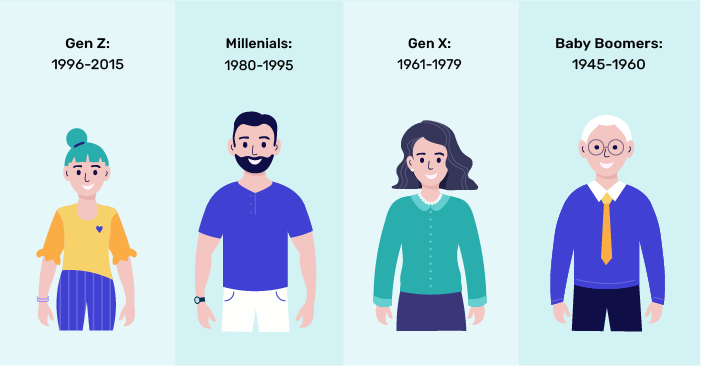People from every generation are working from home a lot more. They are also beginning to demand more of their everyday tasks to be quickly done from the comfort of their own sofa. Like a doctor’s consultation, your son’s tutoring or even your Zumba class. This is where online services provided by video chat are proving extremely convenient. It’s therefore no surprise that their popularity is growing vigorously.
As with most other technological advances, this phenomenon of online services from home fits differently into every person’s life. We adopt innovations in many different ways. But there is one factor that allows us to know pretty accurately how a certain person would react to a new technology. It’s the generational factor.
From Gen Z to Baby Boomers, everyone has their reasons to use video conferencing for online services. And when it comes to offering them, the motivators are even more diverse for each generation. We will examine the following generations:
Generation Z
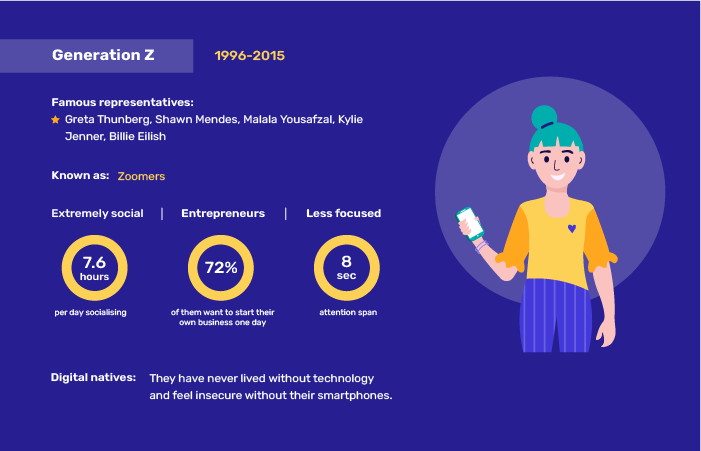
Born after 1996, some Gen Zers aren’t even old enough to vote yet. The oldest of them only entered the jobs market a few years ago and are still far from the corporate tops. With their limited buying potential, aren’t they the least interesting in terms of consumer economy? Well, we are talking about online services here. A video chat that ticks off an item from your to-do list. And this is where you hit a sweet spot with Gen Z.
Gen Z youngsters have grown up surrounded by technology. Therefore they look for conveniences in every area of their lives. Online shopping is like second nature to them. Out of all generations, they have benefitted the most from digital educational tools. This means that they will consider any queueing or traveling to offices an unnecessary waste of time.
Do you see how they will be the perfect customer of a home-based online service? As they gradually increase their disposable income, they will start needing various consultations more regularly. And they are certain to opt for the digital option.
What will they fancy?
One thing to consider though is that while Gen Z are digital natives, they are exclusively bound to their smartphones. Laptops are a device of last resort to them. According to a Snapchat survey 78% of Gen Z admit their mobile phone is their most important device to go online. At the same time 57% of them feel insecure without their smartphone. So providers who are after Gen Z users should ensure their mobile app has all the bells and whistles of the desktop one.
And bells and whistles are a very Gen Z thing. You can attract them by offering a fully integrated experience in your platform. This means scheduling, in-app messaging function, file exchange, visual tools. Being extremely impatient too, they will definitely not tolerate online service apps that make them go through numerous unnecessary steps.
You might wonder what channels to use to promote your service to Gen Z.
Social media? Think again.
This young generation are the kings and queens of Snapchat and Instagram, but according to McKinsey, they’re more pragmatic and analytical about their decisions than the other generations. When deciding on products and services their most trusted source are family and friends. This is good news for providers of online consultations because they gain their customers through word of mouth anyway.
Gen Z is an exciting market and will be soon showing its full potential. But if there is one generation that you must never neglect when you talk about technology, it’s the Millennials.
Millennials
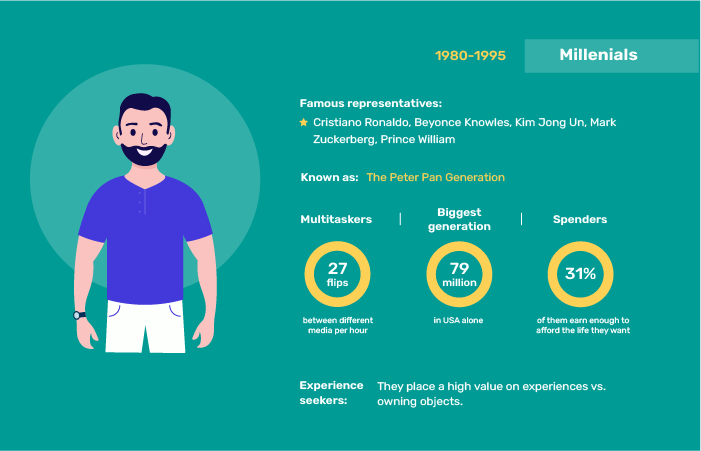
Everybody is interested in millennials and there are good reasons for this. People born roughly between 1980 and 1995 are currently the world’s largest living generation. They have finally recovered from the economic recessions and have a total spending power of $1.4 trillion in the US . They will be a significant consumer of online services but also have various reasons for entering this segment as providers.
Millennials are the most mobile generation with more than half planning to live in their homes 5 years or less. They are also known to dislike commuting which all contributes to their propensity to choose home-based professions. Millennials are currently accumulating valuable professional experience in the corporate world. Come a few years, and they will be looking to practice their knowledge exclusively to their own advantage.
As users of online services from home millennials are already ahead of other generations. There is strong evidence that they require telemedicine services more than the generations before them. Currently only 15% of GPs in the US use telemedicine tools. Since millennials don’t have great healthcare needs yet, you can imagine the kind of revolution that will happen very soon.
How can you win a millennial customer for your online service?
Well, unlike Gen Z, millennials will not choose an online service just because it is online. Millennials are savvy customers who like to visit both physical and online shops for their purchases. To trust an online service they need to be certain about the quality of the service and the technological benefits. Providers have to make sure that their credentials are visible and that they have an informative website. Any extra options that your platform offers will be welcomed by the millennial user.
Enough said about millennials. The future of online services from home becomes even more exciting when you factor in the mature generation – Gen X.
Generation X
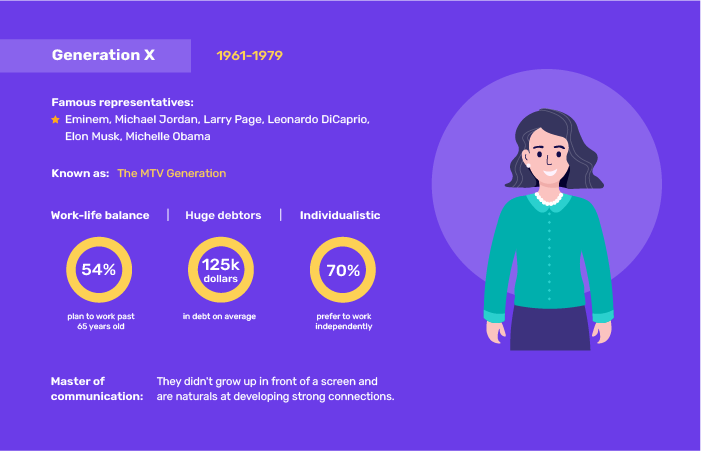
Gen X is sometimes forgotten by media and analysts and that is totally unfair. Known as “the slackers” and “the forgotten middle child”, they are in fact quite remarkable. People born between 1961 and 1979 are not as numerous as the Baby Boomers and Millennials. However, they are currently at the top of their careers and concentrate the largest spending power in the world.
However, Gen X seems to have a widely appreciated problem in the corporate workplace. According to data from the Harvard Business Review, Gen X is the most overlooked for promotions generation. They are however highly skilled, and actually have more direct reports than millennials on similar positions. They are also great communicators and know how to show empathy. This makes Gen Xers the perfect candidate for an online consultant – where your success really depends on your qualities.
In addition to that, many Gen X people are currently looking after their growing children. Аt the same time they are taking care of aging parents. That makes it quite difficult to fit a 40-hour office week and the leap to freelancing is more likely.
Gen Xers are also not afraid of adopting new technology. While Millennials top all charts in terms of technology use, Gen X is now adopting new technology much faster than 10 years ago. As providers of online services, they will appreciate the benefits of a robust video platform with well integrated features.
Gen X as users of online video services
As users, Gen Xers use both laptops and smartphones and will prefer consultants that allow them to have that choice. Their large disposable income makes all sorts of consultations very useful for them – financial investments, tax advice, even career coaching. Managing their heavy workloads takes up a significant amount of time. Therefore choosing an online video solution becomes a necessity for them.
Last but not least, let’s take a look at Baby Boomers. Online video consultations actually fit them really well. Read on to see why.
Baby boomers
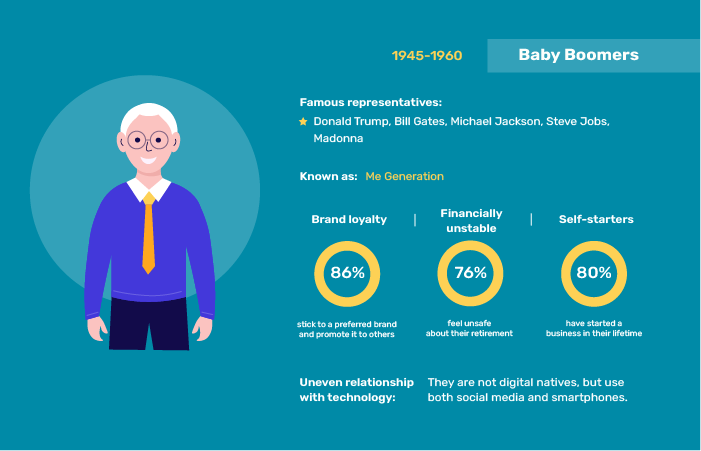
Baby boomers are now going into their retirement age. You would expect them to have a decent disposable income, having finished raising their kids and paying their mortgages. It doesn’t seem to be quite so simple though. The financial crises of the 2000s have had an effect on savings and many baby boomers are delaying retirement. The problem is they are getting older and are generally less tech savvy than millennials and Gen X. This means they will not be the most competitive on the jobs market.
However they are highly skilled due to their long experience. Therefore they will be valuable providers of online consultations in the traditional professions – doctors, lawyers, business consultants.
On the other hand, many baby boomers who are more comfortable in their finances will choose to retire early. This could be either to look after grandkids or to pursue their long neglected hobbies. We often see them leaving their workplace only to start struggling with all their free time. Online consultations present a fantastic opportunity for them to maintain social contacts and attachment to their profession.
Of course, that means baby boomers will require the support of online consultation platforms. For their needs they are likely to choose simple, but reliable solutions that streamline the consultation process. That allows them to focus on what they love.
We shouldn’t underestimate the baby boomers as users of online consultations either. They already need regular access to healthcare and are the second largest living generation. So it’s only a matter of time until they become the largest users of telemedicine. For those of them who are with restricted mobility all other online video services will be particularly helpful.
Which generation to focus on?
There are many reasons to expect that online video services will impact greatly every generation’s life. The truth is there is still time until they reach their peak. However this only means that now is the right moment to start preparing for that. If you are an online service provider, think about how your customers want to connect with you and what you can do to meet their needs.
Here’s the full infographic “Meet Today’s Generations”.

